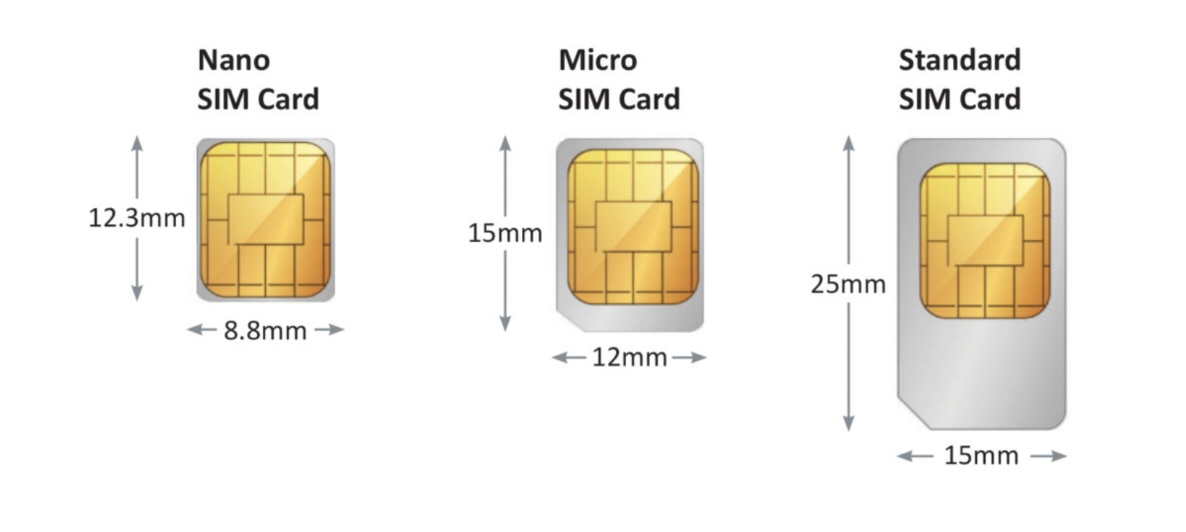
Subscriber Identity Module (SIM) cards are tiny chips that play a monumental role in connecting our devices to cellular networks. As technology evolves, so do the types of SIM cards available in the market, each tailored to specific needs and use cases. In this article, we’ll delve into four main categories of SIM cards: traditional SIM cards, IoT SIMs, Global SIMs, and eSIMs, exploring their characteristics and example use cases.
1. Traditional SIM Cards:
Overview: Traditional physical SIM cards are the most common type of SIM cards. They come in various sizes, including Standard SIM (2FF), Micro SIM (3FF), and Nano SIM (4FF), to fit different devices. Some may have different SKUs as well, which typically only allow them to work with certain devices. For example, you may not be able to use an older 3G SIM card in a 5G modem.
Example Use Cases:
- Smartphones: Standard SIM cards or Nano SIM cards are used in smartphones for voice calls, SMS, and data connectivity.
- Tablets and Dongles: Tablets and USB dongles for mobile internet typically use Micro or Nano SIM cards for data connectivity.
- Cellular Routers: Routers with built-in cellular modems will use data-only SIM cards. Older devices typically will use the standard SIM (2FF) size, while newer devices will mainly use the nano-SIM (4FF) size.
2. IoT SIMs (Internet of Things SIMs):
Overview: IoT SIMs are specifically designed for devices in the Internet of Things ecosystem. They prioritize low power consumption and offer tailored data plans for IoT applications. IoT SIMs closely resemble traditional SIM cards found in smartphones. While some are engineered to withstand harsh environmental conditions, their physical and technological characteristics remain similar.
Example Use Cases:
- Smart Home Devices: IoT SIMs are used in smart home devices like security cameras, thermostats, and sensors to enable remote monitoring and control.
- Connected Vehicles: IoT SIMs facilitate communication in connected cars for features like GPS tracking, diagnostics, and over-the-air updates.
- Industrial Applications: IoT SIMs power machinery, equipment, and infrastructure in industries such as manufacturing, agriculture, and utilities for remote monitoring and automation.
3. Global SIMs:
Overview: Global SIM cards provide connectivity across multiple countries and regions without the need to switch SIM cards or incur high roaming charges.
Example Use Cases:
- International Travel: Global SIM cards are ideal for frequent travelers who need uninterrupted connectivity across different countries without the hassle of changing SIM cards.
- Remote Work: With the rise of remote work, global SIM cards enable professionals to maintain connectivity and productivity while working from different locations around the world.
4. eSIMs (Embedded SIMs):
Overview: eSIMs are built into devices and can be remotely activated or programmed with different carrier profiles, eliminating the need for physical SIM cards.
Example Use Cases:
- Smartphones and Wearables: eSIMs offer flexibility for users to switch between carriers without changing physical SIM cards, making them ideal for smartphones, smartwatches, and other wearables.
- Connected Laptops and Tablets: Laptops and tablets with eSIM support can easily connect to cellular networks without requiring external SIM cards, offering seamless connectivity on the go.
- M2M (Machine-to-Machine) Communication: eSIMs simplify M2M communication by enabling devices like vending machines, ATMs, and digital signage to connect to cellular networks without physical SIM swaps.
- Cellular Routers: In addition to the traditional SIM card option, newer cellular routers may now have the option for eSIM support. Check out eSIM options from Peplink and Sierra Wireless.
The diverse range of SIM card options available cater to various needs and scenarios. Understanding the differences between these SIM card types empowers consumers and businesses to make informed decisions when selecting the right connectivity solution for their devices and applications. Whether it’s staying connected while traveling abroad, enabling smart home automation, or powering industrial IoT deployments, there’s a SIM card tailored to meet every connectivity requirement.

